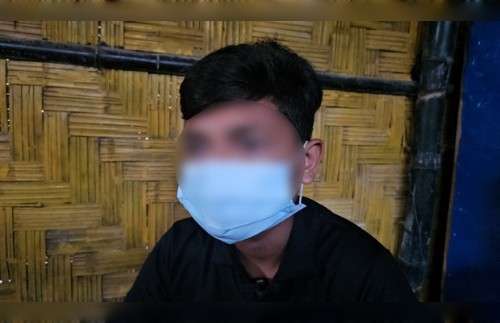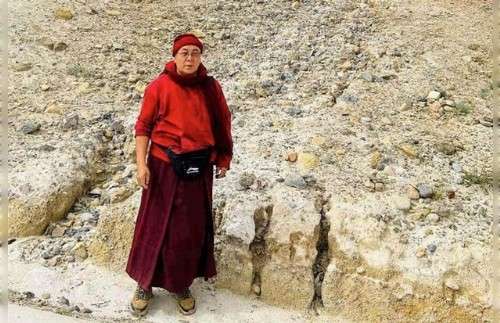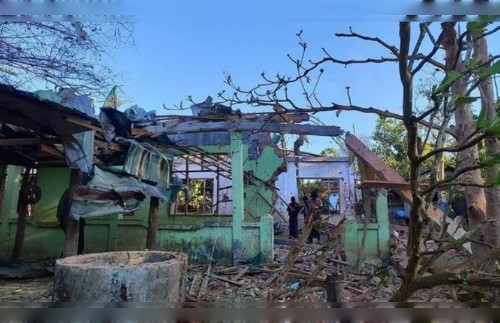Nabijan Habibullah was detained in 2018 but sentenced only this year.

A German-educated Uyghur researcher and professor of linguistics has been detained since 2018 in northwestern China’s Xinjiang Uyghur Autonomous Region and is serving a 15-year sentence on unknown charges, RFA confirmed last week.
Award-winning academic Nabijan Habibullah had worked at universities in the XUAR and Beijing after he returned from graduate studies in Germany in 2014, coming back against the advice of friends who warned about rising pressure on Uyghurs, according to sources inside the region and an exiled scholar.
He was sentenced to 15 years in prison in March, according to Abduweli Ayup, a Norway-based activist and linguist who said he received information about the detained academic in July from close friends of Habibullah both in the XUAR and abroad.
“Through related channels, we heard that Nabijan Habibullah was sentenced to 15 years’ imprisonment in March of this year,” he said.
Habibullah, 38, was a former student of Arslan Abdulla, one of a number of instructors from Xinjiang University who were detained when Chinese authorities began rounding up Uyghur intellectuals and other cultural figures in 2016, Abduweli said.
“Nabijan Habibullah, Arslan Abdulla, Abduqadir Jalalidin, Abdukerim Rahman, and Azat Sultan, among others, were all detained at the same time, starting in February 2018,” Abduweli said.
Tursunajn Bahti, a former linguistics classmate of Habibullah who was another student of Arslan Abdulla, also had been taken way by authorities, he added.
The jailing of Uyghur intellectuals and cultural leaders, which has intensified since 2016, is part of a set of policies has been determined by the United States and others as constituting genocide. The abuses also include forced labor at factories and farms, forced birth control, and the detention of up to 1.8 million Uyghurs in a network of internment camps.
Habibullah was summoned to the security division of the university in February 2018 and taken away by state security police from Urumqi municipality following a brief interrogation, Abduweli said.
‘A staircase to climb’
Born in Lop (in Chinese, Luopu) county, Hotan (Hetian) prefecture, in 1983, Habibullah graduated from Hotan Normal Technical High School in 2002 with a specialization in Chinese, according to online sources. He then studied and worked at Xinjiang Normal University, Xinjiang University, both in the XUAR’s capital Urumqi, and at Minzu University, a college for ethnic minorities in Beijing.
Habibullah began studying at the University of Göttingen in Germany in 2012. After he graduated two years later, many friends reportedly warned him that the situation in the XUAR was deteriorating and recommended that he remain in Germany rather than return home to find work, said Abduweli Ayup.
The academic made the decision to return to the XUAR after convincing himself that he would be safe there if he only focused on his academic research and stayed out of social conflicts and other issues that authorities deemed contentious, he said.
“He decided that he would be able to do even better work there,” Abduweli said. “He believed that he would be able to do more by teaching Uyghur students who were studying language and literature, providing them with a staircase to climb and a stage for their work, and so he went back.”
Abduweli founded the Uyghuryar Foundation, a Uyghur advocacy and aid organization also known as Uyghur Hjelp in Norwegian, which maintains a list of detained Uyghur intellectuals.
After returning to the XUAR, Habibullah reportedly landed a job at Minzu University in Beijing, and two years later found work at Xinjiang University in Urumqi. In June 2016, Nabijan completed a doctoral dissertation, titled “The Dictionary Meanings of Old Uyghur Verbs from Buddhist Texts Translated Into Chinese,” according to a biography provided by an RFA listener who declined to be named.
In two years, Habibullah had won four research grants and published more than 10 articles in prestigious scholarly journals. In 2017, he was named an outstanding undergraduate advisor and researcher at Xinjiang University, his biography says.
Then in February 2018, he was taken away for “training” along with other leading teachers and researchers from the university.
“He was at home one evening, and the security division of Xinjiang University said it had to speak with him about and called him into the office,” Abduweli said.
“When he went to the office, Nabijan Habibullah saw that police officers from national security forces were waiting there,” he said. “[They] put a black hood over his head and took him away.”
Possible reasons for arrest
A staff member from the division of cadres at Xinjiang University would not provide any information about Habibullah to RFA. But a security guard from the university confirmed that he had been detained and taken to a makeshift holding center for intellectuals at Xinjiang Normal University in February 2018.
In an earlier investigation to confirm the imprisonment of a poet, RFA learned that a special detention center had been set up at Xinjiang Normal University for intellectuals in Urumqi, who were detained there before being transferred to an internment camp.
The Xinjiang University security guard said that though he and his colleagues were responsible for summoning suspects, taking them to the national security police, and transferring them to jail, they did not know the details of individual cases and that he was unaware of the details of the linguist’s sentence.
Possible reasons for Habibullah’s detention and later imprisonment include his studies at the German University where he came into contact with Turkologists, his relationship with Abdulla, and his research into Uyghur culture, Abduweli said.
“We obtained information suggesting that these were the reasons for Nabijan’s detention,” he said. “Our information source was unable to confirm which of these reasons was the main one.”
Reported by Shohret Hoshur for RFA’s Uyghur Service. Translated by the Uyghur Service. Written in English by Roseanne Gerin.
Copyright © 1998-2020, RFA. Used with the permission of Radio Free Asia, 2025 M St. NW, Suite 300, Washington DC 20036. https://www.rfa.org


















